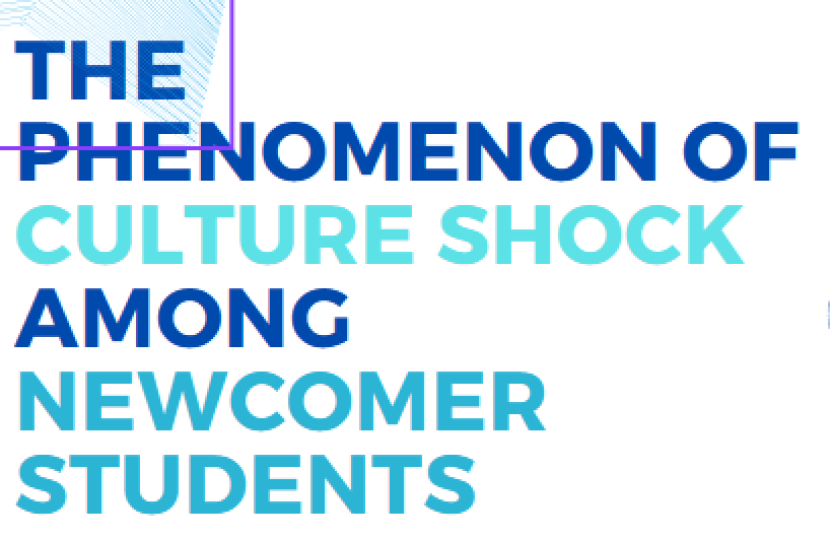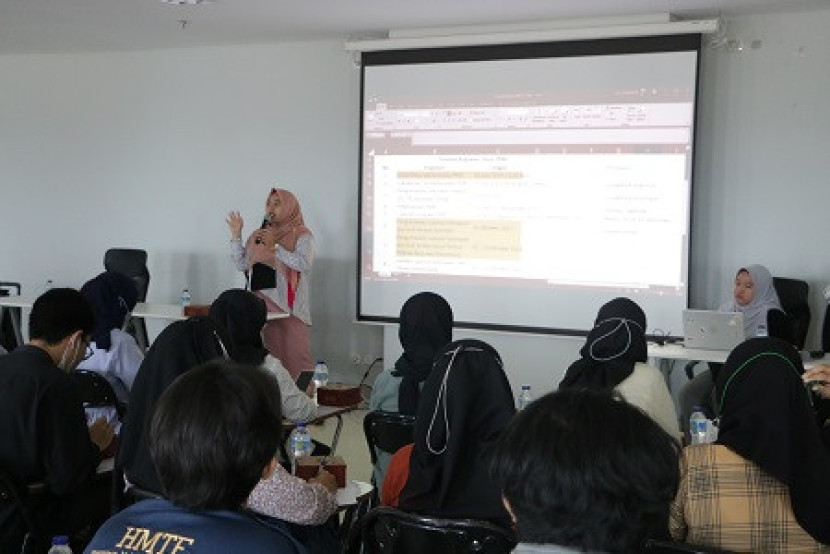 della meliyana
della meliyana
The Phenomenon of Culture Shock Among Newcomer Students
Iptek | 2023-12-20 19:36:28
Abstract
Culture shock is an event that is often experienced by some people, migrant students for example. This occurs because of a mismatch in terms of environment, social, cultural, and socialization. The transfer that occurs from a student to a college student makes some new students experience problems, resulting in a lack of psychological well-being. The purpose of this journal is to explain what is meant by culture shock so that this phenomenon can be used as a lesson and can be a reference for prevention efforts. The method used in this journal is a literature study, which is a series of studies that use library data collection methods, or research whose objects are explored through various library information (such as books, scientific journals, newspapers, magazines, and other documents (Sukmadinata & Syaodih, 2005).
Keywords: Culture Shock, Student, New Comer Student
Introduction
Culture shock is an event that is often experienced by several groups, migrant students for example. this happens because of a mismatch in terms of environment, social, culture, and association. The transfer that occurs from a student to a student makes some new students a problem so that there is a lack of well-being both from a psychological perspective.
Facing a very significant change in situation compared to their place of origin makes a person become inhibited in self-adjustment, getting along with new people, and can even affect learning during their lectures. This happens quite a lot and even we ourselves can feel culture shock when we become new students.
Therefore, this journal article can help new students in understanding and strategies to overcome culture shock, so that new students can gain life welfare and explore academic potential and better ways to socialize.
Literature review
- Culture Shock
According to Samovar, individuals typically undergo a four-stage progression when experiencing culture shock. These four stages can be conceptualized as a U curve, appropriately referred to as the U Curve.
1. The first phase, positioned at the top left of the U-curve, is known as the optimistic phase. During this phase, individuals experience a sense of excitement, hope and euphoria as they anticipate their immersion into the new culture.
2. The second phase, called cultural issues, is characterized by the emergence of difficulties associated with an unfamiliar environment. These challenges may include language barriers, adaptation to a new transportation system, acclimatization to an educational institution, and other related factors. Typically, this phase gives rise to feelings of disappointment and dissatisfaction.
3. The recovery phase, the third phase in the process, requires that individuals gain an understanding of their newly adopted culture. During this stage, individuals gradually make adaptations and modifications to their coping mechanisms to effectively navigate the unfamiliar cultural landscape.
4. The adjustment phase, the final phase, occurs at the peak of the U-shaped curve. At this point, individuals have gained a thorough understanding of key aspects of their new culture, including values, unique customs, communication patterns, beliefs, and other relevant aspects.
- New Students
A student is basically an individual involved in an educational institution, be it a university, institute, or academy. According to (Budiman, 2006), a student is an individual who takes part in educational endeavors at a post-secondary institution to acquire skills at the undergraduate level. In contrast, (Daldiyono, 2009) argues that a student is someone who has successfully completed their education at a high school and is currently engaged in further academic activities. Taking the perspectives of the various experts mentioned above, researchers have ultimately concluded that a student is an individual who is currently undergoing higher education at a university or college.
- Newcomer Students
Newcomer students are students who come to an area to study both abroad and domestically, therefore they inevitably have to enter into a new social culture. To get into a new environment is not as easy as we see, but this self-adjustment is a challenge for newcomer student.
Newcomer students often experience culture shock, which is characterized by feelings of uncertainty, confusion, and anxiety when they are moved to a new environment. This can happen even if they are in the same country. Habits, language, and behavior are the main sources of the problem.
Methodology
This form of inquiry is known as literature review research, which includes a summary of studies that use library data collection methods or research that involves extracting objects through diverse sources of bibliographic information such as books, scientific journals, newspapers, magazines and other documents (Sukmadinata & Syaodih, 2005). A literature review is also a sequence of activities conducted through the search, documentation, and analysis of written materials centered around a topic or variable of research interest (Nursalam, 2008). In the context of this study, the reading materials, notes, and writing process were directed to data related to culture shock. The data, which has been obtained from various library sources, is compiled into one document that is used to discuss the topic or variable that has been determined through description (Kurnia, 2007), with a special focus on culture shock as the subject matter or data to be described.
Result and finding
The concept of culture shock was originally introduced by Hall (1959), where it refers to distress arising from the contrast between the familiar environment of one's place of origin and the differences encountered in a new and unfamiliar environment. (Subsequently, Oberg 1960) investigated the exploration of culture shock, which entails visceral reactions and revealed the existence of deficits experienced by individuals in their new environment. This deprivation manifests cognitively, this causing a disruption of one's identity (Ting-Toomey, 1999).
Culture shock includes emotional responses to unexpected cultural gaps and misunderstandings arising from diverse experiences, resulting in feelings of helplessness, emotional distress, fear of deception, and emotional and social abandonment (Bock, 1970; Adler, 1975; Pedersen, 1995). The occurrence of culture shock is facilitated by cultural differences, where symptoms manifest in the form of atypical emotions that have a significant impact on individuals, such as psychological stress (Xia, 2009). Culture shock can also be explained by the differences between the previous culture and the recent culture faced by individuals, resulting in confusion and then fostering negative sentiments towards new conditions (Lubis, 2015).
Investigations conducted by (Oberg,1960) revealed various aspects of culture shock, consisting of (1) the presence of tension stemming from attempts to adapt psychologically, (2) a sense of mourning for acquaintances, social status, work, and belongings, (3) rejection or non-acceptance of members of the new culture, (4) confusion regarding roles, anticipations, and principles, (5) anxiety disgust, and anger after realizing the existence of a cultural gap, and (6) a lack of helplessness due to a lack or even inability to cope with the recent environment. (Hamboyan and Bryan's 1995) study mentions factors that may influence an individual's culture shock, including solitude, financial hardship, cultural misunderstanding, mistrust, and scientific scrutiny.
Therefore, it is hoped that institutions or universities need to foster a learning environment that facilitates diversity, especially for newcomer students who experience difficulties in dealing with the culture shock they experience. The existence of guidance and counseling services must be utilized in such a way as to avoid and overcome the problem of culture shock.
Conclusion
This culture shock is a negative reaction or emotion caused by the feeling of being different from the new culture faced by a person with their old culture. This phenomenon can happen to anyone, new students are one of them. Being a newcomer is definitely not an easy thing, let alone having to face cultural differences such as differences in language, values, and beliefs between the individual's native culture and the new culture, instances of discrimination and disrespect from the host country population, as well as feelings of isolation and financial difficulties faced by individuals. This literature aims to increase understanding in the domain of psychology, particularly in the field of clinical psychology as it relates to cultural psychology. Specifically, it aims to convey the idea that culture shock trauma can affect individuals' stress levels if they are unable to adapt to their new cultural environment. The author also hopes that, with the understanding explained in this literature, especially aimed at new immigrant students, it can be anticipated to prevent culture shock, and can prepare themselves again.
References
Sukmadinata, & Syaodih, N. (2005). Metode Penelitian Pendidikan. Bandung: PT Remaja Rosdakarya. ← Book
Ahmad, A. (2022). Dampak Fenomena Culture Shock Terhadap Adaptasi Sosial Budaya pada Mahasiswa Perantauan FITK UIN Syarif Hidayatullah Jakarta. ←Thesis
Putra, E., Sujadi, E., Bustami, Y., & Indra, S. (2022). The Effect of Social Support and Emotional Intelligence on Culture Shock of the Newcomer Students: the Mediating Role of Resilience. Enlighten, 5(2), 66-79← Journal
Nursalam .(2008). Konsep & Metode Keperawatan (ed. 2). Jakarta: Salemba Medika. ←Book
Kurnia, S. S. (2007). Menulis ilmiah: metode penelitian kualitatif. Jakarta: Yayasan Obor Indonesia. ← Book
Hall, Edward. T. (1959). The Silent Language. New York: Doubleday. ← Book
Ting-Toomey, S. (1999). Communicating Across Cultures. New York: Guilford Press. ← Book
Oberg, K. (1960). Symptoms of Culture Shock. Practical Anthropology, 177-182. ← Book
Bock, P. K. (1970). Culture shock: a reader in modern cultural anthropology. New York:
Knopf. ← Book
Xia, J. (2009). Analysis of Impact of Culture Shock on Individual Psychology. International
Journal of Psychological Studies, 1(2), 97. DOI: 10.5539/ijps.v1n2p97. ← Journal
Lubis, R. (2015). Sosiologi Agama : Memahami Perkembangan Agama dalam Interaksi
Sosial. Jakarta, Indonesia : Kencana. ← Book
Hamboyan, H., & Bryan, A. K. (1995). International students. Culture shock can affect the
health of students from abroad. Canadian Family Physician Médecin de Famille
Canadien, 41, 1713–1716. ← Journal
Maizan, S. H., Bashori, K., & Hayati, E. N. (2020)1. Analytical theory: Gegar budaya (culture shock)23. Psycho Idea, 18(2), 147-154. ← Journal
Disclaimer
Retizen adalah Blog Republika Netizen untuk menyampaikan gagasan, informasi, dan pemikiran terkait berbagai hal. Semua pengisi Blog Retizen atau Retizener bertanggung jawab penuh atas isi, foto, gambar, video, dan grafik yang dibuat dan dipublished di Blog Retizen. Retizener dalam menulis konten harus memenuhi kaidah dan hukum yang berlaku (UU Pers, UU ITE, dan KUHP). Konten yang ditulis juga harus memenuhi prinsip Jurnalistik meliputi faktual, valid, verifikasi, cek dan ricek serta kredibel.











